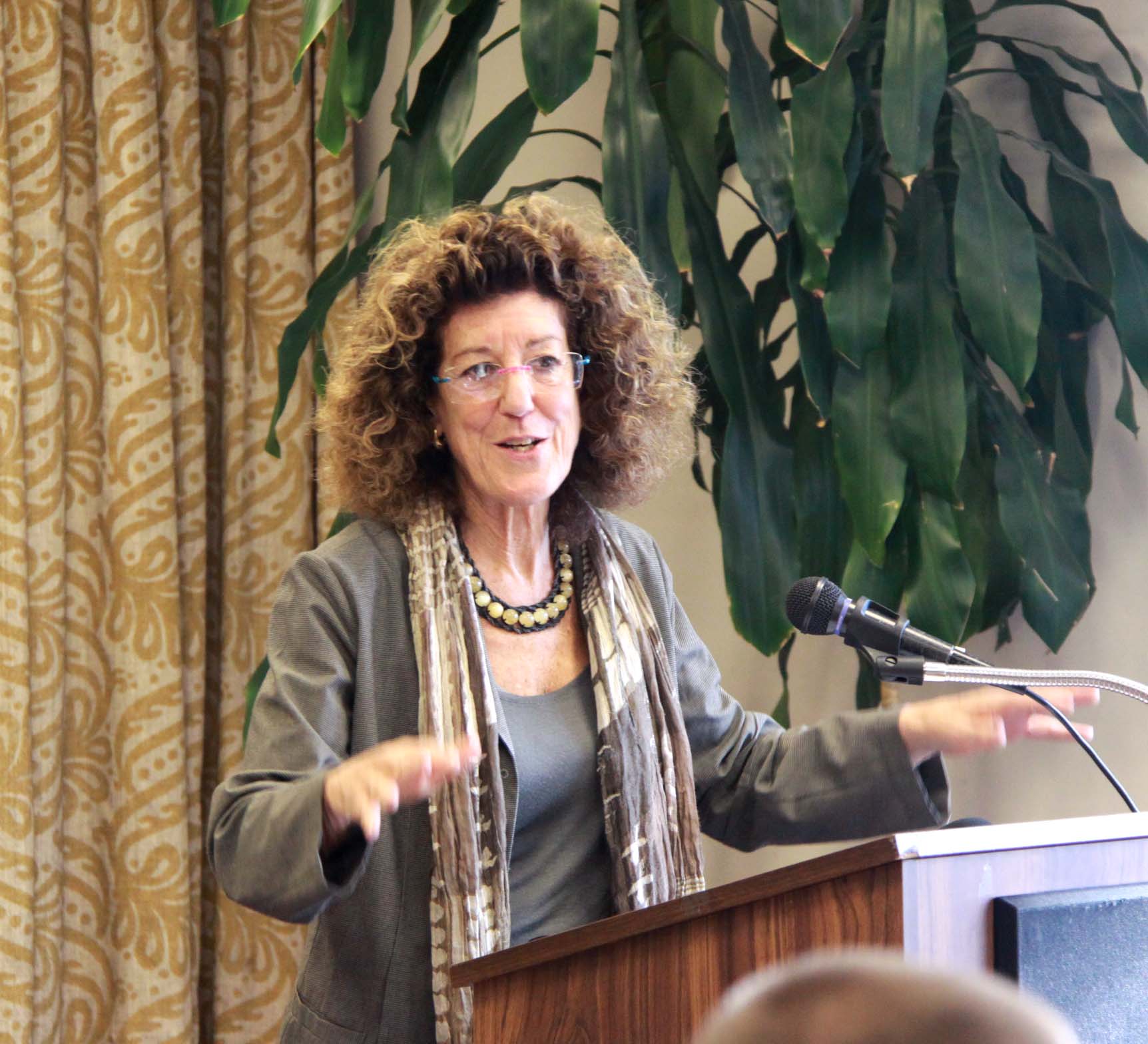2012 | 2011 | 2010 | 2009 | 2008 | 2007 | 2006 | Archived events
2012
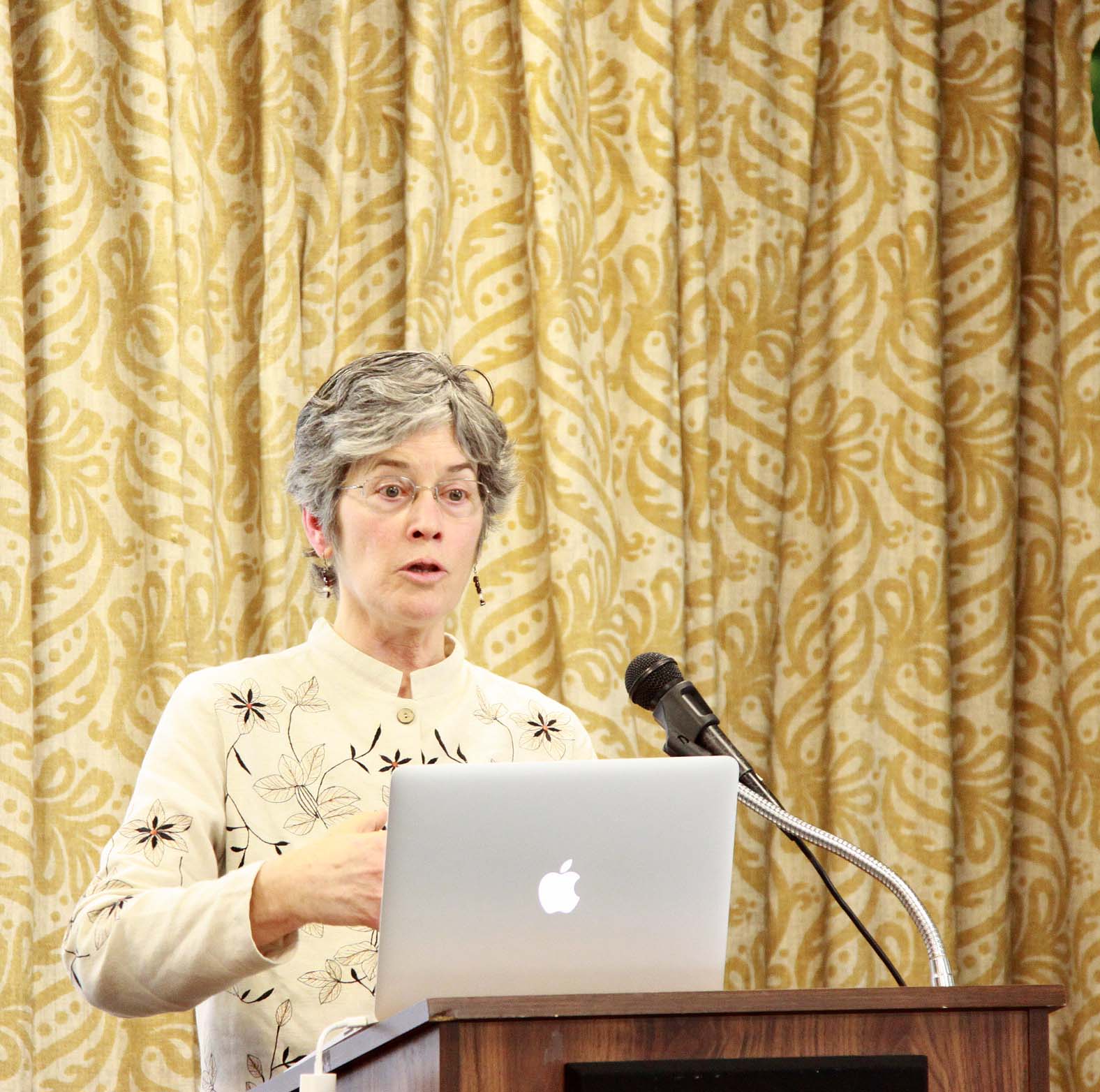 |
| Molly Anderson |
On December 5, 2012, GPF and the Working Group on Food & Hunger invited Molly Anderson from the College of the Atlantic to discuss the International Assessment of Agricultural Knowledge, Science and Technology for Development (IAASTD) report and the future of sustainable food policy. Ms. Anderson was one of the coordinating lead authors of the study that reflected the work of more than 900 agricultural experts from 110 countries. To this day the IAASTD report remains by far the most definitive study of global agricultural science and technology. During the luncheon, Ms. Anderson discussed the report’s implications for policy making. She also discussed the contested terrain of food system alternatives after Rio+20.
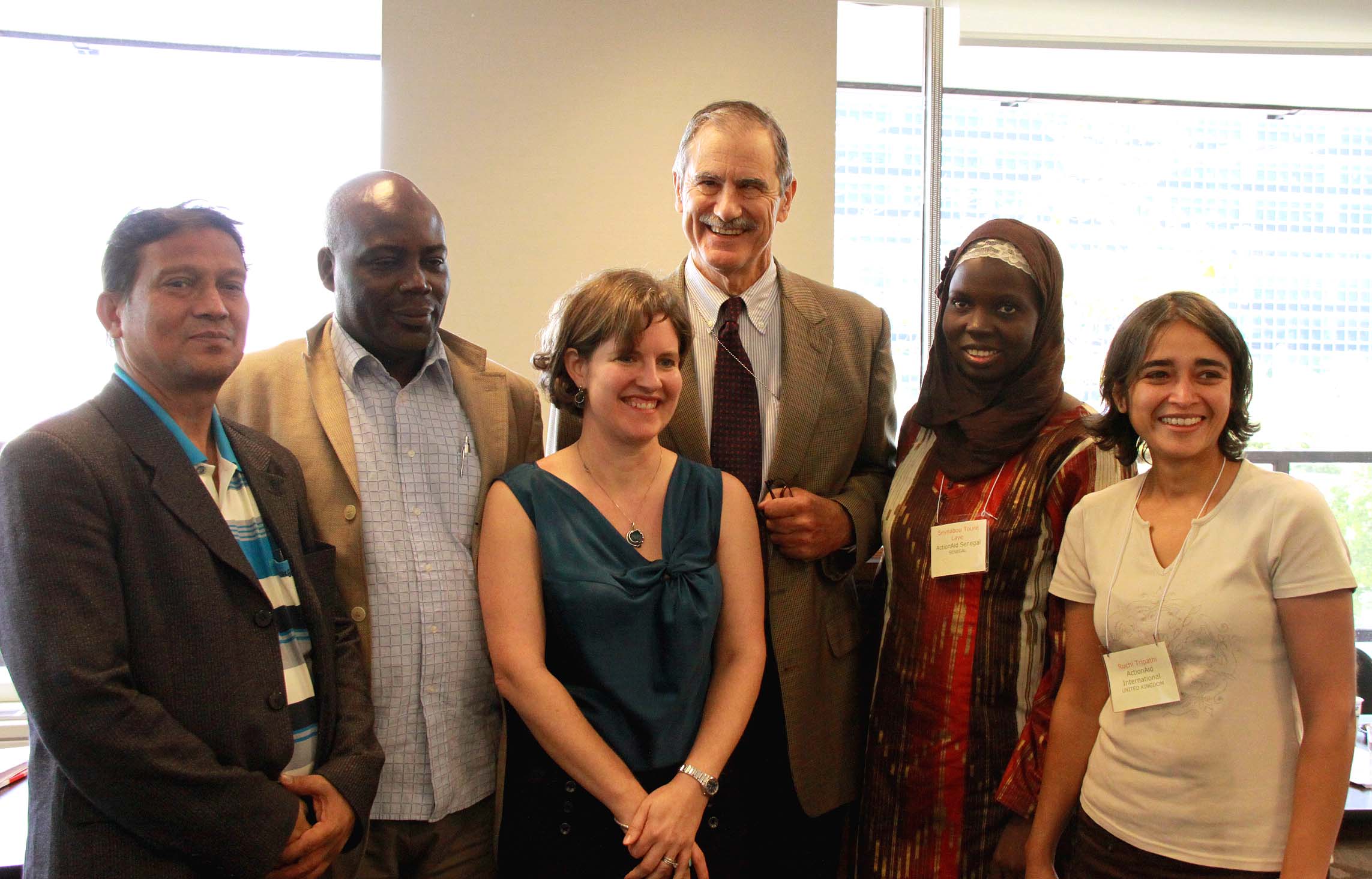 |
| ActionAid Representatives and Jim |
Land Grabbing - A Grassroots Perspective: A Discussion with ActionAid Representatives (September 13, 2012)
On September 13, 2012, GPF and the Working Group on Food and Hunger organized a policy luncheon on land grabbing with ActionAid representatives from Senegal, Tanzania and Bangladesh. The representatives provided examples of cases of land grabbing from their countries, highlighting the existing challenges concerning land tenure. In addition to the specific country representatives, Ruchi Tripathi and Marie Brill from ActionAid International introduced the different ways ActionAid is working on land tenure issues globally. The policy luncheon was a part of the 'Future of Global Food Policy' - forum series at the United Nations and was heavily attended by both delegations and members of civil society.
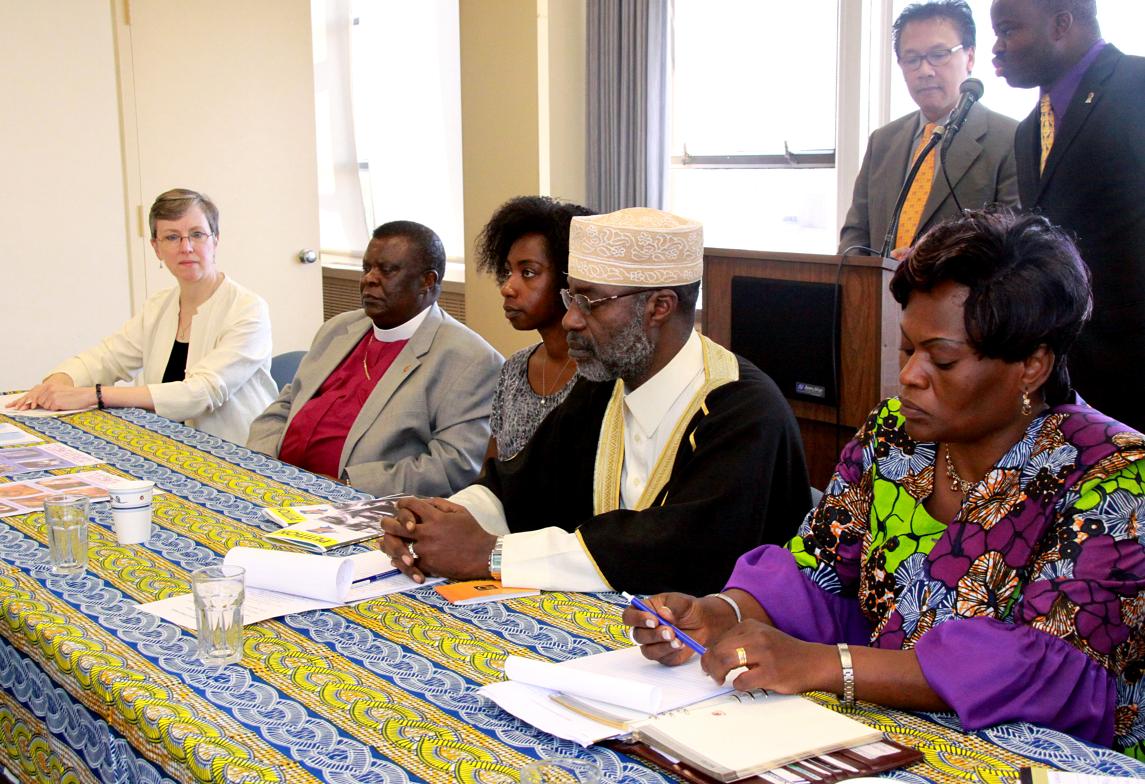 |
| The panelists |
GPF co-hosted a discussion with representatives of a delegation from the DRC gathering church and civil society leaders. The delegation was in New York to hand a petition to the Secretary General and the Security Council calling for peace and justice in the DRC. During their presentations, the panelists talked about the history of Rwandan intervention in DRC, the role of natural resources in the conflict, and the plight of Congolese women.
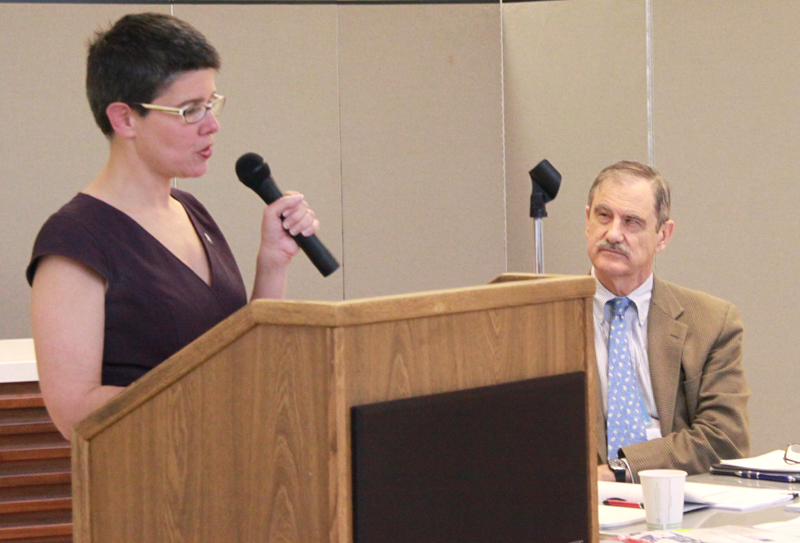 |
| Noelle and Jim |
 |
GPF co-sponsored this book launch with the Presbyterian Ministry at the UN. Author Jonathan Randall, a longtime Washington Post correspondent, spoke about the re-issue of his classic 1983 study of politics and civil war in Lebanon, the Israeli invasion, and the massacres of Sabra and Shatilla. Just World Books publisher Helena Cobban, herself a Middle East expert and journalist, also spoke.
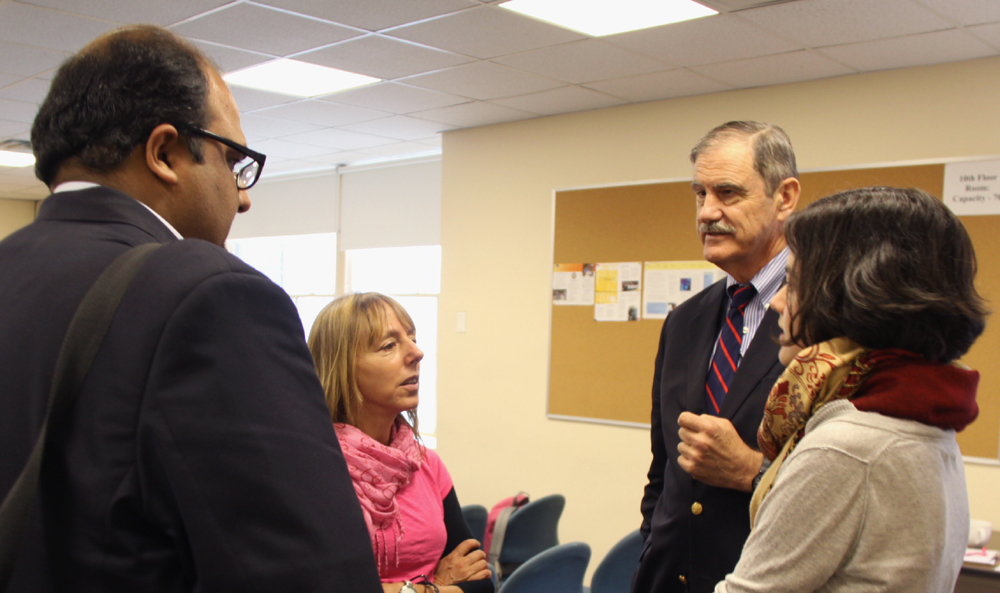 |
| Shahzad Akbar, Medea Benjamin and James Paul |
Drones (unmanned aerial vehicles) have become the signature weapons of the US covert air strikes in Afghanistan, Pakistan, and Yemen. The use of drones in undeclared wars violates both the US Constitution and international law. Drone strikes are carried out without due process, and do not discriminate between intended targets and bystanders. Many innocent civilians, including children, are killed as a result. Medea Benjamin’s book is a call to action, with a look at what activists, lawyers, and scientists are doing to rein in the drones.
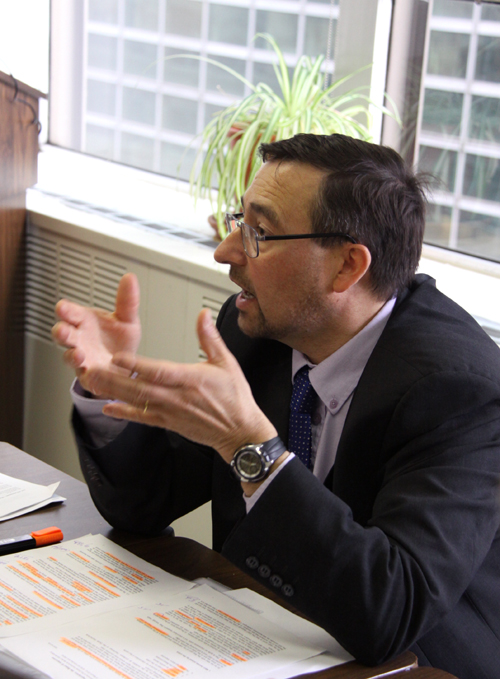 |
| Bruno Tissot |
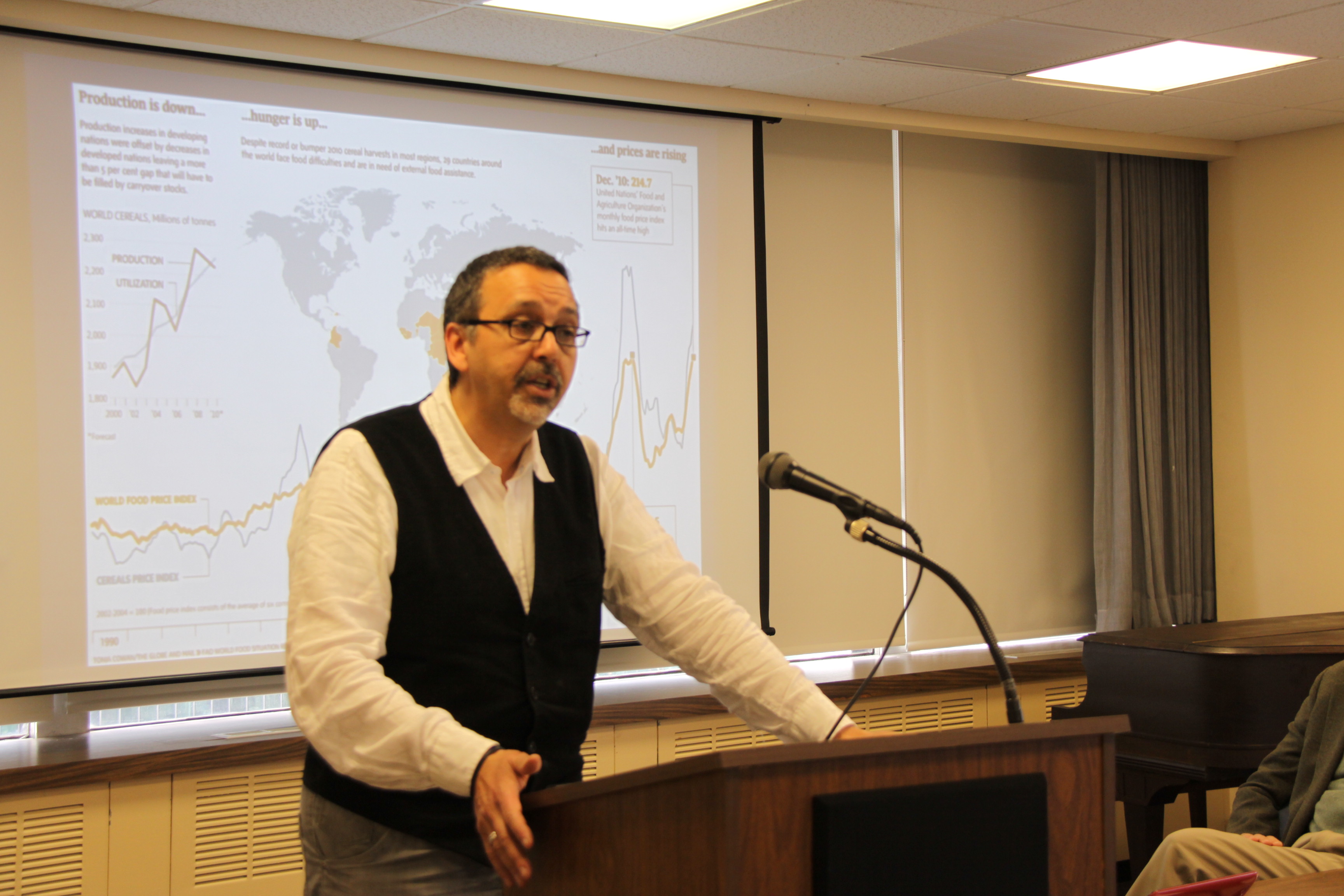 |
| Haroon Akram-Lodhi |
The Land Grabbing Disaster and the Global Food System: A discussion with Haroon Akram-Lodhi (April 11, 2012)
Hedge-funds, governments, and agro-industrial industries have been buying or leasing large blocks of agricultural land around the world in a process widely known as "land grabbing." Land grabbing has displaced tens of millions of small producers, who have lost their livelihoods as a result. Global Policy Forum invited Professor Haroon Akram-Lodhi of Trent University to speak about the issue.
 |
|
Abby Goldberg, Evan Lyon, Mario Joseph,
and Brian Concannon
|
Law in the Time of Cholera: UN Peacekeeping, Cholera, and Human Rights in Haiti (April 9, 2012)
GPF organized this event with the Institute for Justice and Democracy in Haiti to discuss the cholera epidemic in Haiti, and the the larger role of MINUSTAH, the UN's Peacekeeping force that brought cholera to the region. Co-sponsers include the Center for Constitutional Rights, International Association of Democratic Lawyers, Mennonite Central Committee, Presbyterian Ministry at the UN, and United Methodist Women. The discussion featured Abby Goldberg (New Media Advocacy Project), Mario Joseph (Bureau des Avocats Internationaux), Dr. Evan Lyon, and Brian Concannon (Institute for Justice and Democracy in Haiti).
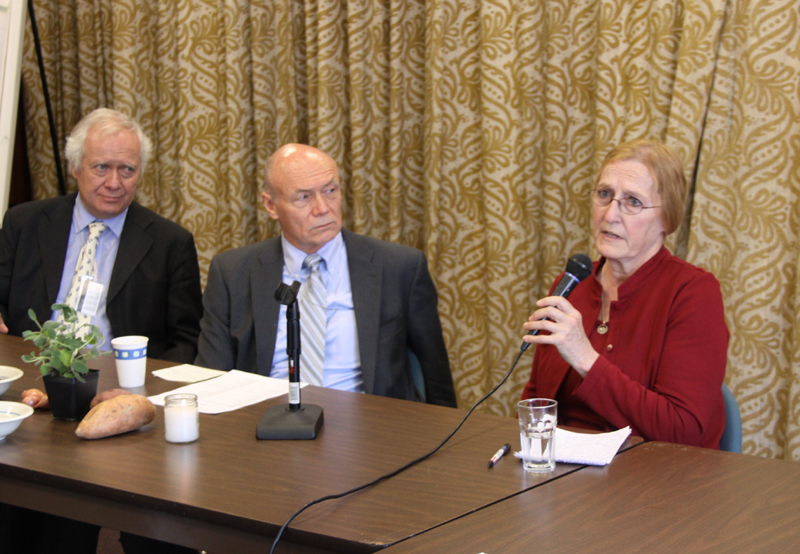 |
| Pat Mooney, David Weaver and Dena Hof |
The Movement for Food Sovereignty: A discussion with La Via Campesina (March 26, 2012; New York)
La Via Campesina coined the term, "Food Sovreignty," in 1996. The term refers to a policy framework advocated by small-scale farmers that allows them to define their own agricultural system.
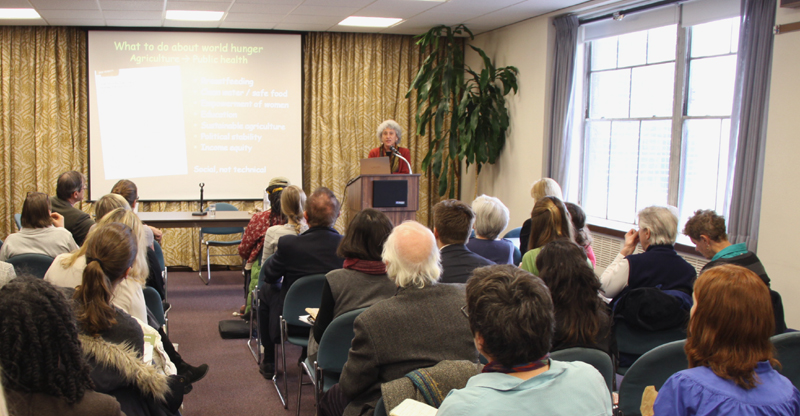 |
| Marion presents |
Corporate Influence on Food Policy - A discussion with Marion Nestle (February 15, 2012; New York)
This discussion with Professor Marion Nestle examined the increasing influence of corporations on food policy. Through the deregulation of Wall Street, a sharp rise in lobbying power and billions being poured into marketing, giant corporations have taken over the food system. Nestle warned against public institutions partnering with food companies and advocated for tighter regulation of corporations.
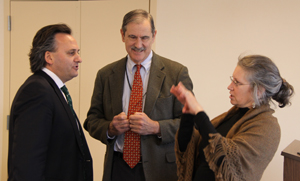 |
| Paul Mikov, James Paul and Doreen Stabinsky |
This discussion featured Doreen Stabinsky, Professor of Global Environmental Politics at College of the Atlantic in Bar Harbon, Maine. With Rio + 20 coming up in June, this timely discussion was focused on the link between climate change and agriculture. Professor Stabinsky warned that “business as usual is not an option” and advocated for a reform of the overall agriculture and food system: a paradigm shift away from industrial agriculture and towards sustainable production and consumption. She warned that unless we address the current model of development, we will be unable to achieve global food security. Delegates, UN staff and members of the NGO community participated.
2011
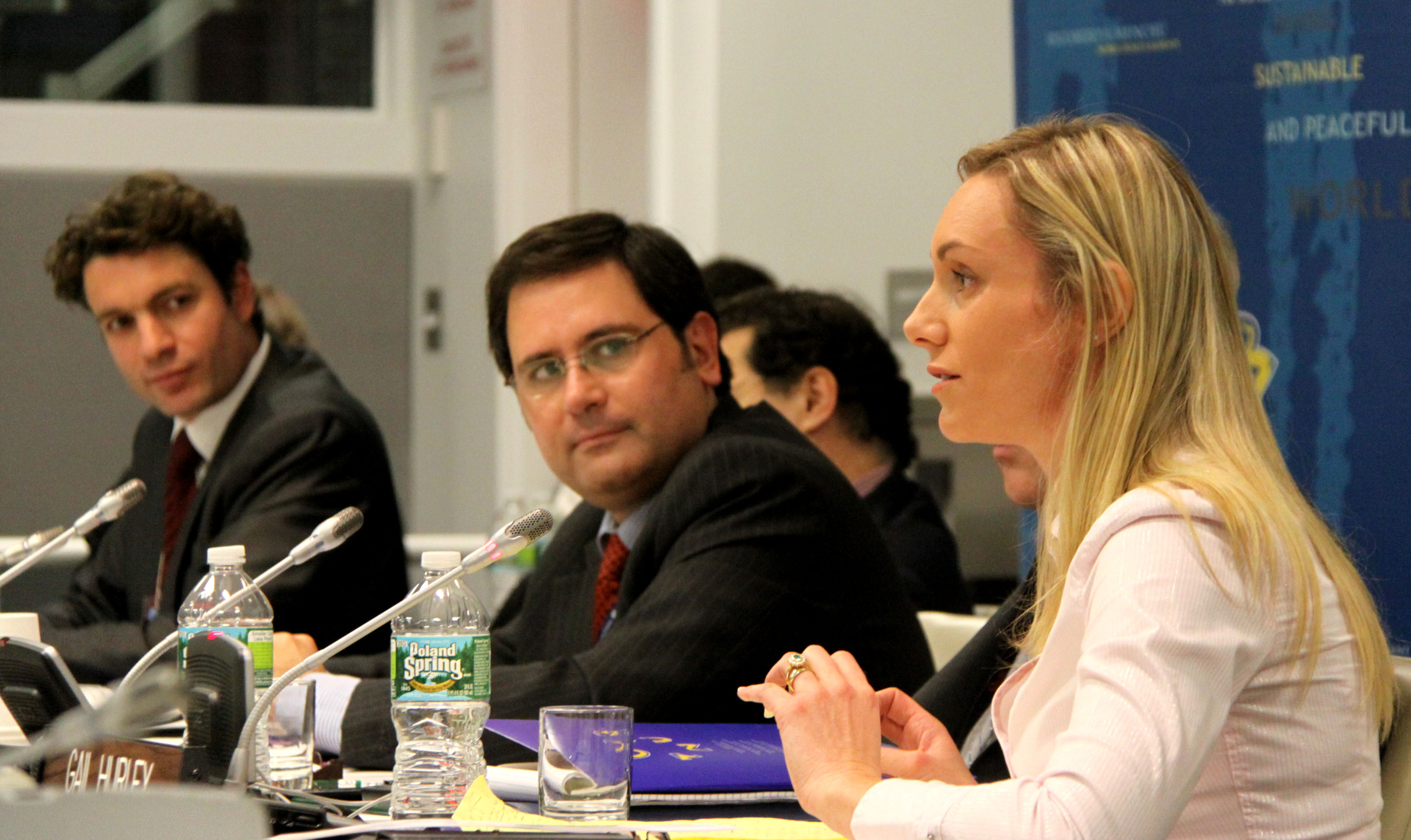 |
| Julien Meimon, Manuel Manonelles and Gail Hurley |
Nurturing Development: The Role of Innovative Financing for Development and its Implications of Economic Governance (December 6, 2011)
In the context of the 5th High Panel Debate on Financing for Development, GPF and UBUNTU Forum co-sponsored this event on how to better align the twofold goals of effective economic governance and fundraising for development. The discussion featured Manuel Manonelles (UBUNTU Forum), Peter Bakvis (International Trade Union Confederation), Julien Meimon (Leading Group on Innovative Financing for Development), Gail Hurley (United Nations Development Program) and Rodrigo Robredo (Spanish Foreign Ministry). The debate focused on Financial Transaction Taxes, in particular the Currency Transaction Tax (CTT) and on the Air Transport Levy as three innovative methods which succeed in raising revenues for development while taxing those individuals and economic sectors that have the financial capacities to pay. At the same time, FTTs and CTTs can improve economic governance and push speculation back.
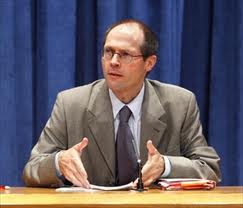 |
| Olivier |
Recent Developments on the Right to Food - A Conversation with UN Special Rapporteur Olivier de Schutter (November 16, 2011; New York)
In this discussion, UN Special Rapporteur Olivier de Schutter gave an update on the Right to Food since the start of his second term as the UN Special Rapporteur on the Right to Food. De Schutter talked about the urgent need to curb commodity speculation, end subsidies and for the WTO to change trade rules that privelege exporting countries. De Schutter also touched upon the negative impacts of biofuels, land grabbing, and the need to recognize and support small-scale farmers.
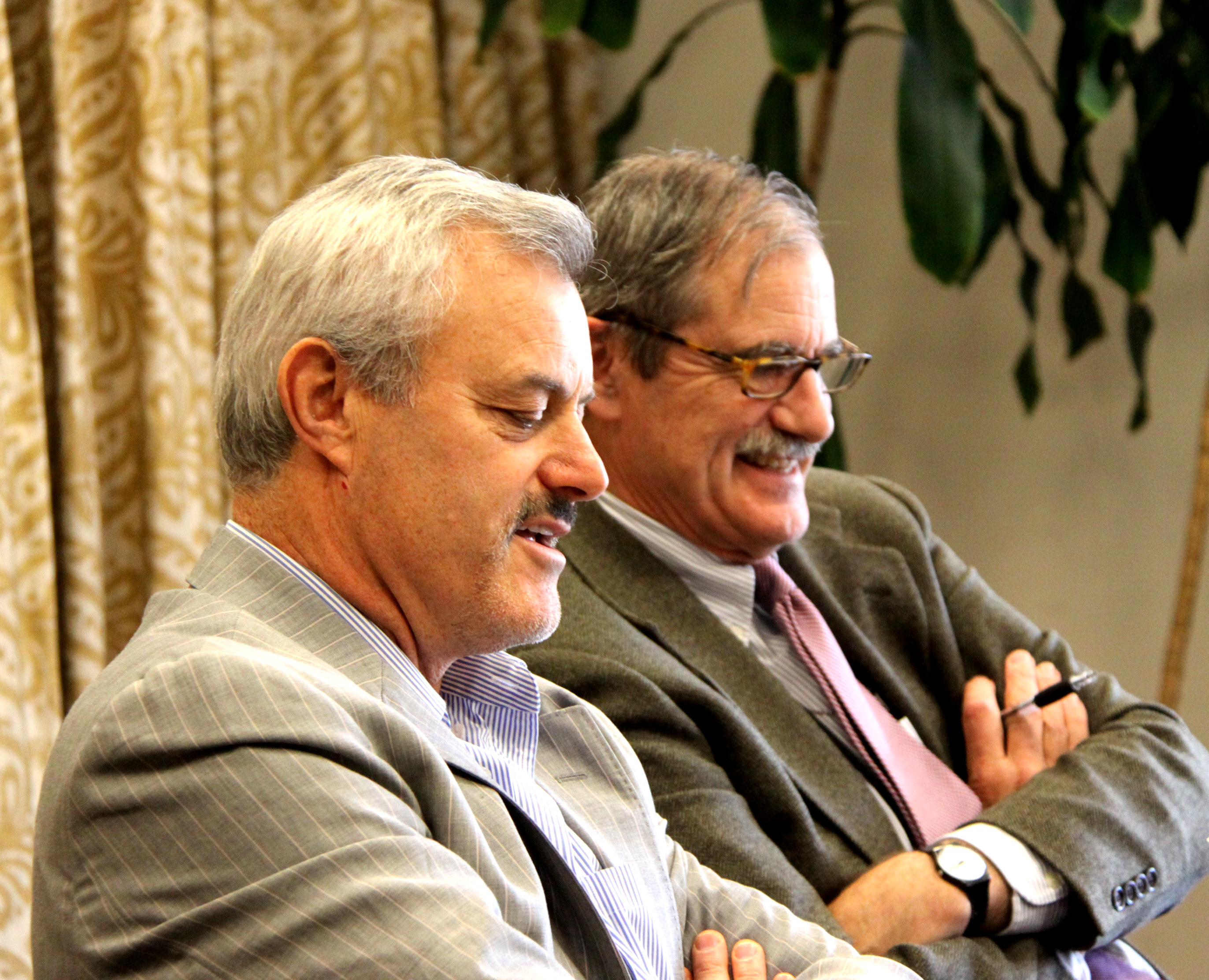 |
| Ken Davies and Jim Paul |
Purchase for Progress - Connecting Smallholder Farmers to Markets in Africa and Central America: A discussion with Ken Davies (October 28, 2011; New York)
This discussion featured Ken Davies, Coordinator of UN World Food Programme’s “Purchase for Progress” (P4P) initiative. This five-year pilot program began in September 2008 and is based in 21 countries in Africa, Asia and Latin America. Davies spoke about the structure of the program and efforts by WFP to buy staple crops from farmers’ organizations in these countries, through direct or forward contracts. P4P trains small and medium traders in farming techniques and crop quality control. P4P is primarily funded by Bill & Melinda Gates Foundation and has connected over 500,000 small farmers to markets.
 |
| Picture Credit: fidh.org |
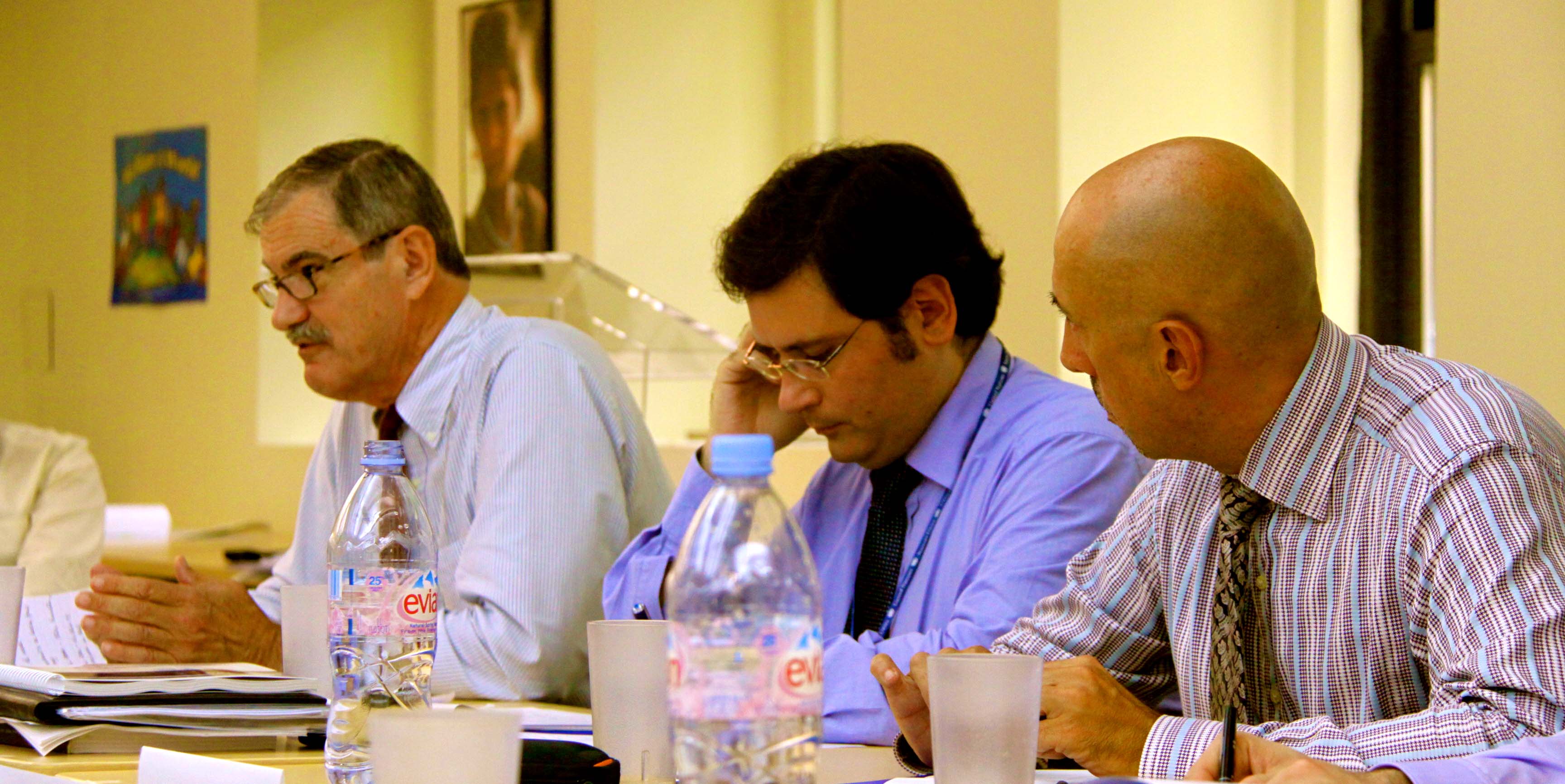 |
| James Paul, Manuel Manonelles & Jose Maria Fernandez Lopez de Turiso |
Innovating in Justice, Innovating in Finance: Time for a Financial Transaction Tax (September 22, 2011; New York)
The debate focused on the introduction of a Financial Transaction Tax (FTT), which could generate resources to fund development. Introducing a tax of only 0,005% on currency exchange transactions, for instance, would be sufficient to raise over $30 billion per year. Panelists acknowledged the unprecedented willingness among governments and policymakers to establish such a tax. The introduction of a FTT has long ceased to be a utopia: its implementation is economically and technically feasible, and is now a matter of political will. GPF has long advocated for the introduction of global taxes, and published a major policy paper on this topic in 2001. However, Jim Paul and other NGOs representatives warned that governments may try to hijack the revenue generated by a tax such as the FTT to fill their own coffers.
 |
| Rashid Khalidi & Doug Hostetter |
Palestine: The UN Debate and Beyond - A Discussion with Rashid Khalidi, Karima Bennoune, and Benjamin Beit Hallahmi (September 12, 2011; New York)
This discussion featured Rashid Khalidi, Edward Said Professor of Modern Arab Studies at Columbia University, Karima Bennoune, Professor of Law and at Rutgers University, and Benjamin Beit Hallahmi, Professor of Psychology at the University of Haifa, Israel. It examined the context of Palestine’s UN bid and explored the legal ramifications of the idea of Palestinian statehood. According to Khalidi, for the last two decades the rules functioning as the basis for peace negotiations have been imposed by the US, often at the insistence of its Israeli ally. Although in his view the Palestinian initiative will not end the occupation or result in liberation, it is a positive step for changing the terms currently underpinning the conflict. The UN, a multilateral forum with an international legal basis, is where this issue should be decided.
 |
| More than 40 experts attended |
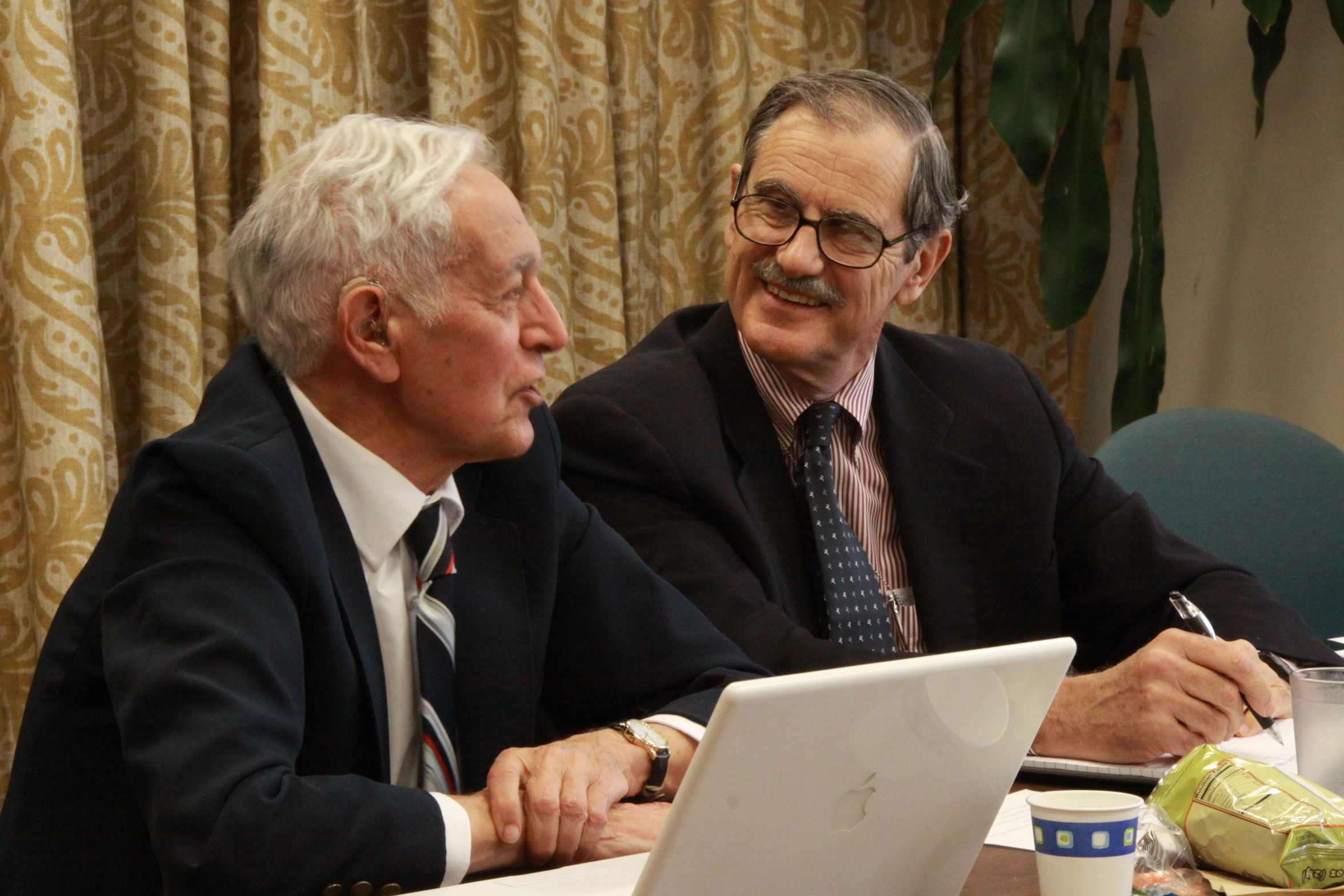 |
| David Pimentel and Jim Paul |
Energy and Eating - How biofuels affect the world's food supply and what we should do about it: A discussion with David Pimentel (March 16, 2011; New York)
The diminishing supply of oil and high energy prices encourages the conversion of grain and other food products into biofuels. This luncheon discussion with David Pimentel, Emeritus Professor at Cornell University, addressed the negative impacts of biofuels on the environment and economy. Delegates, NGOs and UN staff participated. Pimentel talked about the challenge of energy conservation and how grains should be used to feed the 4.5 billion people who are currently malnourished worldwide.
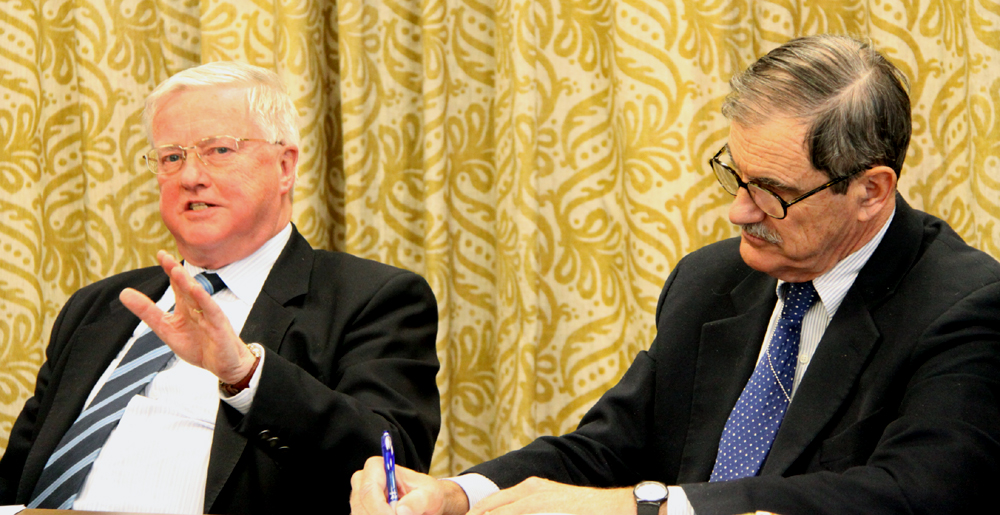 |
|
Martin Lees & Jim Paul
|
The Food Crisis and the Limits to Growth: A Discussion with Martin Lees (February 9, 2011; New York)
This discussion featured Martin Lees, former Secretary General of the Club of Rome and former top UN official. In a world where one in three people are under-nourished in sub-Saharan Africa, and where 80 per cent of income is spent on food in African countries, a dialogue on the food crisis and limits to growth is essential. The current model of growth is failing to eradicate hunger and is failing to provide opportunities for people to find productive work. Additionally, economic growth is destabilizing the climate and ecological systems and is ignoring the interests of future generations.
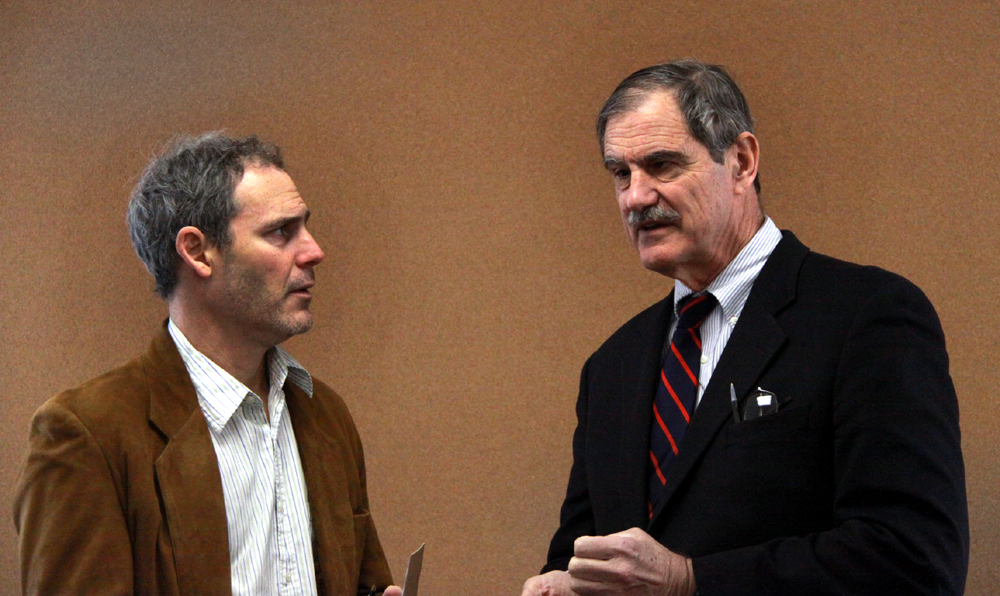 |
| Frederick Kaufman & Jim Paul |
Speculation and Food: price instability and the food reserve option - A Discussion with Frederick Kaufman and Karen Hansen-Kuhn (January 20, 2011; New York)
In this discussion, investigative journalist Frederick Kaufman addressed wheat market prices, grain futures and the "financialization of food", as well as the "subversion" of market. Karen Hansen-Kuhn, International Program Director at the Institute for Agriculture and Trade Policy discussed government food reserves as a method to confront price volatility.
2010
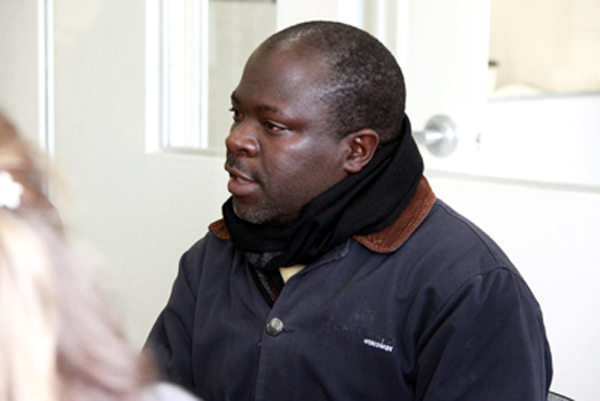 |
| Danny Chingimbu presents |
 |
| Olivier de Schutter and Jim Paul |
This forum, organized by Church World Service and co-sponsored by the NGO working Group on Food and Hunger, was held in connection with a UN summit to assess progress on the eight Millennium Development Goals to cut extreme poverty in half by 2015. The participants, coming from a range of humanitarian, church and advocacy groups, discussed what systemic change is needed to empower impoverished people around the world. The event was followed by a reception at GPF's office.
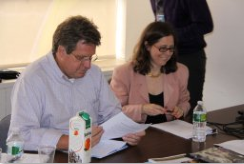 |
| Mr. Pace and Ms. Trahan prepare their notes |
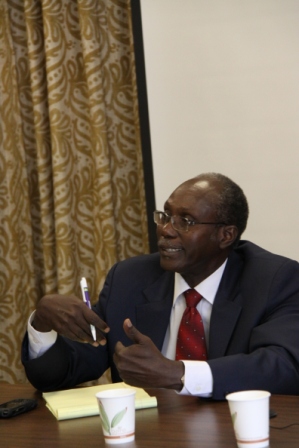 |
| Chavannes Jean-Baptiste |
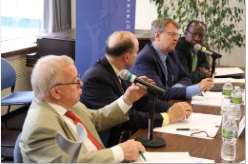 |
| The distinguished panelists discuss UN finance issues |
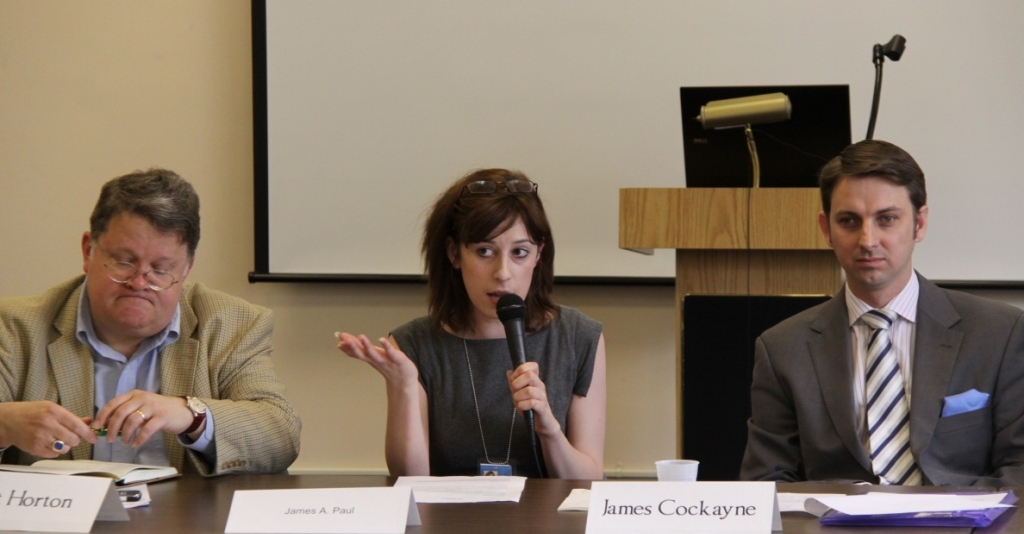 |
| Alice Powell of GPF introduces our speakers |
2009
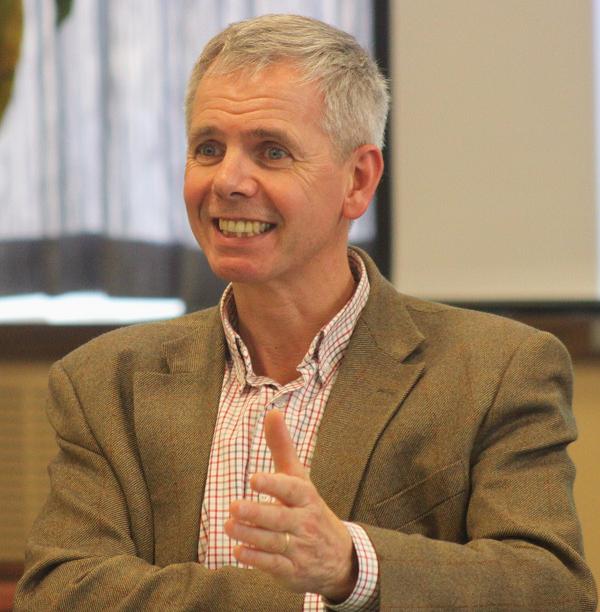 |
| John Christensen presents |
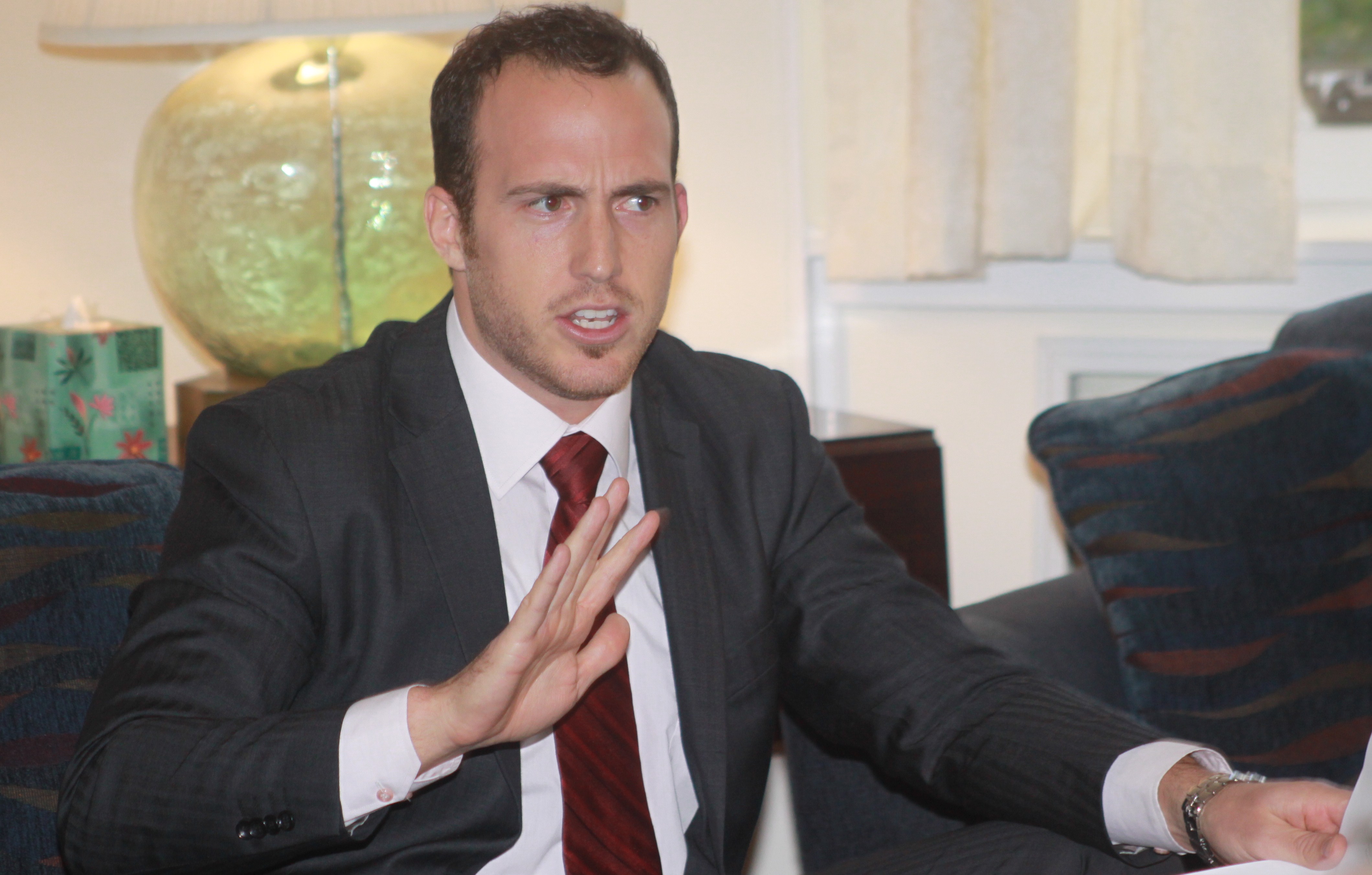 |
|
John Filson presents
|
 |
| Abdulsatar Yunis demonstrates |
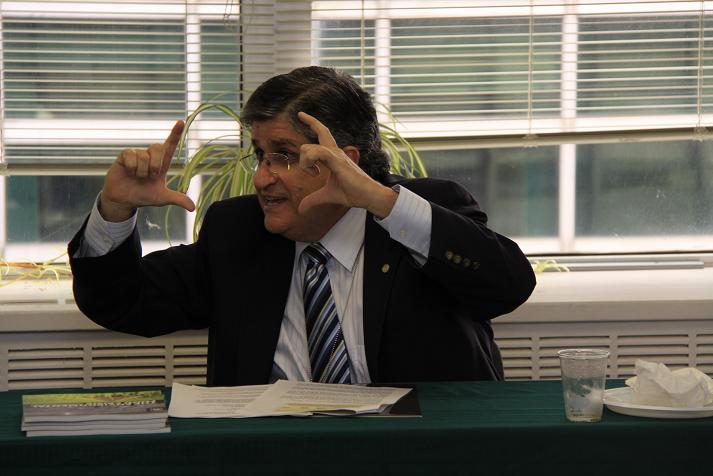 |
| Ricardo Sanchez presents |
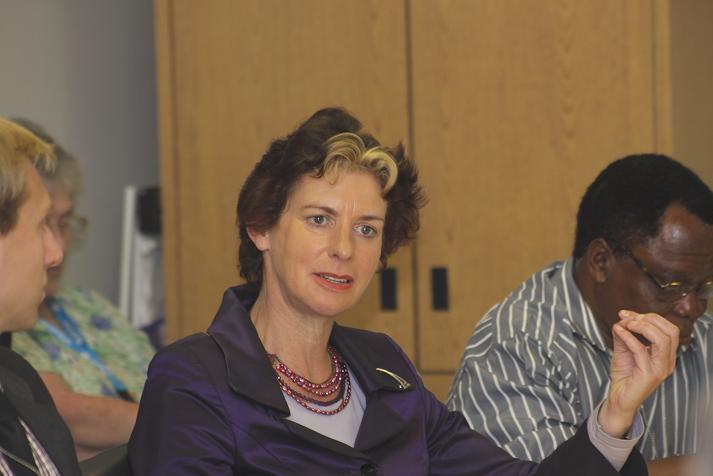 |
| Gerda Verberg presents |
Global Policy Reform of Food and Agriculture (May 11, 2009; New York)
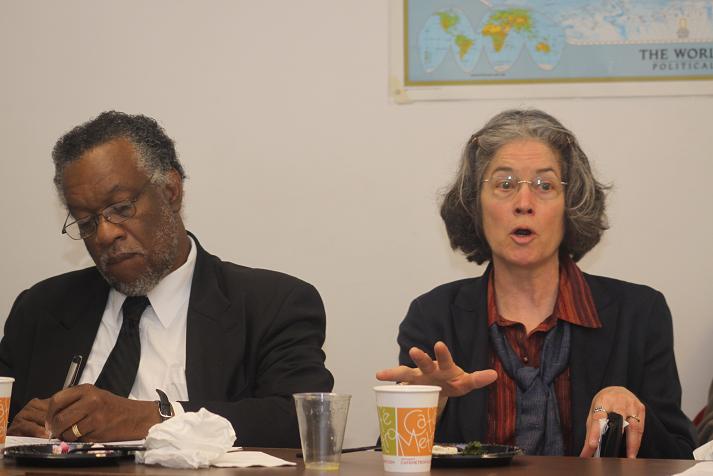 |
| Molly Anderson presents |
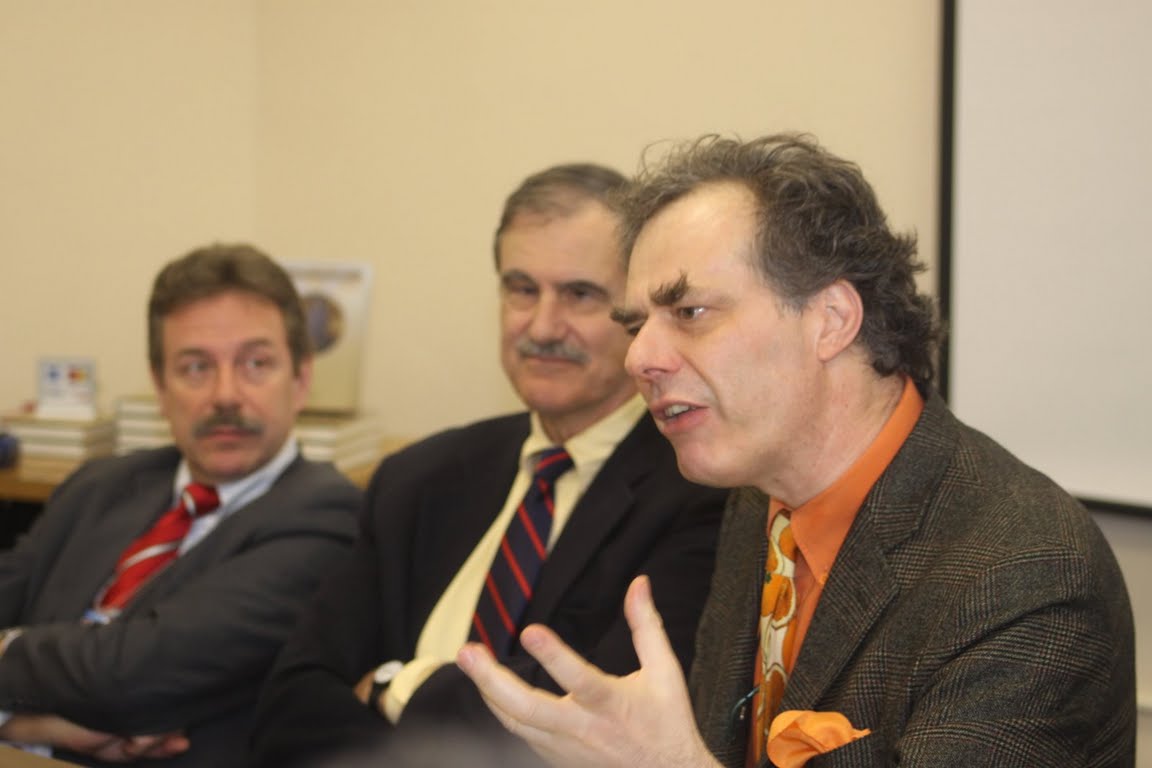 |
| Daniele Archibugi presents |
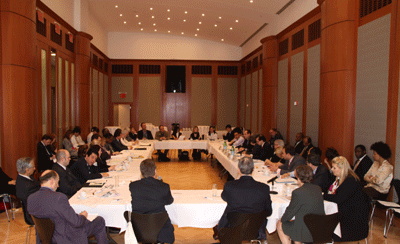 |
Meeting with Conor Foley - Author of The Thin Blue Line (February 9, 2009; New York)
Author Conor Foley has worked for UNHCR and other humanitarian agencies in a number of crises - including Kosovo, Afghanistan, Bosnia, Sri Lanka and other countries. His new book, The Thin Blue Line, develops a critique of humanitarian action and military intervention. His analysis grapples with the complexities and dilemmas of the humanitarian project. At this lunch meeting, he argueed that military intervention is rarely a good solution to the world's problems.
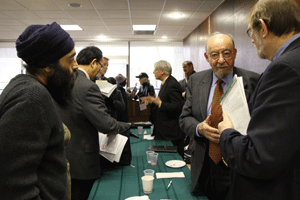 |
2008
Step Up to the Plate: Ending the Food Crisis (October 16, 2008 - New York)
On the World Food day, GPF supported an event on the food crisis, organized by World Hunger Year. Speakers talked about the real causes and solutions to the crisis. The Great Hall at Cooper Union was packed with more than 500 people including activists, students, and journalists.
More information on the event here. To read the Call to Action and then sign-on, click here. To watch excerpts from Stepping up the Plate please click here.
 |
2007
Demystifying the Iran Crisis: Nuclear Weapons and Mad Mullahs? (November 13, 2007 - New York)
A discussion and fundraising reception to support the work of Global Policy Forum. Special guests were Ervand Abrahamian (CUNY Distinguished Professor) and John Burroughs (Executive Director, Lawyers' Committee on Nuclear Policy) Each speaker touched upon the historical context of a nuclear Iran in relation to the United Nations and the international community.
Policy Luncheon on Iraq (October 19, 2007 - New York)
Iraq experts on Security Council delegations and selected UN staff members had a telephone dialogue with three leaders of major parliamentary blocs in Iraq . The parliamentarians and the delegates discussed the renewal of the UN mandate of the Multinational Force (MNF) in Iraq .
Co-Sponsors: Global Policy Forum, Mennonite Central Committee UN Office and World Council of Churches UN Office.
Money may not be everything, but Civil Society Perspectives on Financing the International Development Goals (October 15 - 16, 2007 - Bonn)
One year ahead of the United Nations Financing for Development Conference in Doha in 2008, Global Policy Forum Europe, terre des hommes and Social Watch hosted an international seminar on development financing. The meeting served as a brainstorming session. Participants shared experiences and expectations seeking to contribute to the formulation of civil society benchmarks for the Financing for Development Conference.
Full Program
Whose Partnership for Whose Development? (July 4, 2007 - Geneva)
One day ahead of the "Global Compact Leaders Summit" at the UN in Geneva, an international group of NGOs and researchers sponsored a hearing, to assess the partnership approach of the Global Compact and to propose alternatives for real corporate accountability. For more information, see the speaking notes from this event.
Workshop on the Midterm Review of the MDGs (June 22, 2007 - Bonn)
Program in German
From Disaster to Peacemaking (June 12, 2007 - New York) GPF co-sponsored two events at the UN with Worldwatch Institute and the Friedrich Ebert Foundation on how natural disasters and the subsequent international aid response can influence peacemaking in conflict areas. Worldwatch researchers Michael Renner and Zoe Chafe presented their report "Beyond Disasters: Creating Opportunities for Peace" to a group of experts from the UN and NGOs - first at a roundtable and then at a policy luncheon.
Luncheon on Iraq Policy Issues with Iraq Experts from the Security Council and the UN (May 22, 2007 - New York )
Kristele Younes of Refugees International, spoke about the Iraqi refugee crisis and James Paul of Global Policy Forum, introduced the new study "War and Occupation in Iraq "
Co-Sponsors included Global Policy Forum, Refugees International and Mennonite Central Committee.
Reception to Launch the Report "War and Occupation in Iraq" (May 8, 2007 - New York )
Over fifty of GPF's friends and donors gathered in New York at the home of Board member Dinni Gordon for a pre-release party of the "War and Occupation in Iraq" report. Special guest Denis Halliday, the former UN Humanitarian Coordinator for Iraq, gave a speech and GPF's Jim Paul and Céline Nahory introduced the report and talked about the research and writing process.
Workshop on The Precarious State of Public Finance (March 29, 2007 - Berlin)
Joint workshop by the DGB-Bildungswerk, GPF Europe and terre des hommes. Program in German
Global Public-Private Partnerships - Privatisation of Multilateralism? (January 23, 2007 - Nairobi)
At the World Social Forum 2007 in Nairobi, the Friedrich Ebert Foundation and Global Policy Forum Europe organized a joint workshop, critically assessing the development of "global partnerships" between government and private actors. The workshop aimed to trace the scale and scope of these global "partnerships," and to discuss their limits, risks and side-effects. Panel discussants included representatives from Consumer Information Network, Social Watch, People's Health Movement and Third World Network.
2006
Book Launch: Christian Fundamentalism vs. Progressive Advocacy (October 20, 2006 - New York)
GPF co-sponsored a book-launch event of Faith in Public Life's Executive Director Jennifer Butler's book on the increasing influence of the Christian Right at the UN and beyond.
The Global Climate Crisis (October 3, 2006 - New York)
Global Policy Forum and International Catholic Organizations Information Center organized a two-part event on global warming. After a screening of Al Gore's film, "An Inconvenient Truth," three panelists - Michael Renner from Worldwatch Institute, Mohammad Reza Salamat from DESA, United Nations and James Tripp, General Counsel at Environmental Defense - discussed global climate change and steps to address it.
Challenges for Reconstruction and Peace in the Aceh Province, Indonesia (April 26, 2006 - New York)
Global Policy Forum organized a Brown Bag Luncheon with Michael Renner of Worldwatch Institute. Renner talked informally about his recent trip to the Aceh province. His presentation with photos, maps, and satellite images covered the problems of the post-tsunami reconstruction, the shaky peace agreement between the Free Aceh Movement (GAM) and the Jakarta government, and ongoing challenges to the political process and democratization.
The Situation in Haiti and the Role of the UN (April 2006 - New York)
GPF invited Brian Concannon, Director of the Institute for Justice and Democracy in Haiti, to talk at a brown-bag luncheon about the situation in Haiti and the role of the UN.
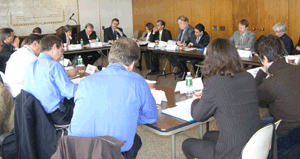 |
Enhancing NGO Relations with the United Nations - The Missing Element in the UN Reform Agenda (February 15, 2006 - New York)
Global Policy Forum, the Friedrich Ebert Foundation and the International Confederation of Free Trade Unions opened a dialogue with UN delegates and members of the UN Secretariat on the future of NGO participation at the United Nations. Participants discussed reform proposals for greater NGO participation; best practices that can be enhanced and replicated; and areas where governments are most resistant and where political progress appears possible. Discussion also centered on the role NGOs can play in future deliberations on UN reform and what steps are necessary to engage new NGO players and social movements in the work of the UN.
Archived events

